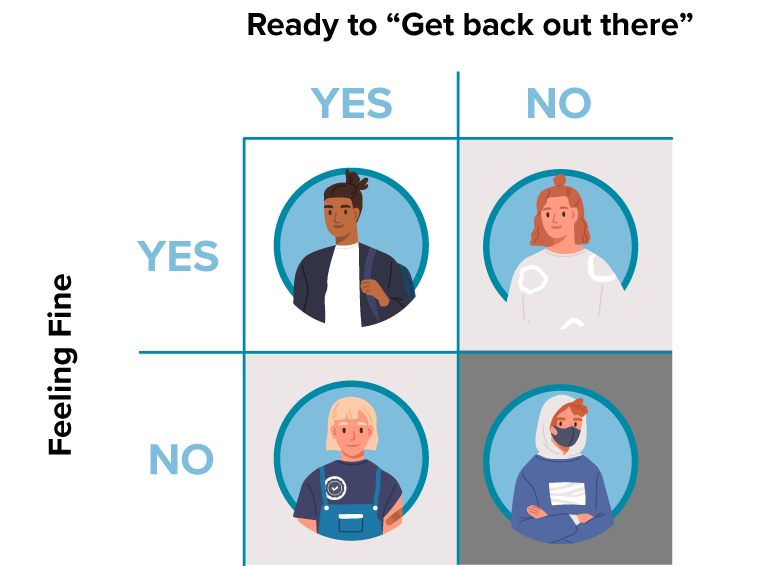Tips for Parenting Teens During this Hybrid Summer
 With the COVID-19 pandemic receding, vaccination rates rising, and capacity restrictions on events and businesses lifting, many families are wondering – could this be a more “normal” summer?
With the COVID-19 pandemic receding, vaccination rates rising, and capacity restrictions on events and businesses lifting, many families are wondering – could this be a more “normal” summer?
But after living through more than a year of pandemic-related anxiety and stress, people that are fully vaccinated (including teens) will have varying levels of comfort when it comes to ditching their face mask and socializing in large groups. And that’s okay – there is no one-size-fits-all approach to transitioning back to “normal.”
Whether your teen is chomping at the bit to see their friends or having a harder time readjusting, we’re breaking down the four teen archetypes for summer 2021 — and tips for parenting each type of teen.

Social Butterfly Billie
Your teen has been itching to get out of the house! Social butterflies are more than ready to pick up their lives where they left off before COVID-19 and jump straight back into the pre-lockdown swing of things. From hang outs with friends to attending in-person events, a social butterfly is ready for it all — no apprehension here.
Tips for parenting a Social Butterfly Billie:
- Keep up with the latest COVID-19 safety guidance. Make sure your teen is well-informed about their degree of risk, considering the COVID-19 trends where you live and your teen’s vaccination status. If your teen is not fully vaccinated, they should still wear a mask when in indoor public places.
- Talk with your teen about the dangers of substance use. Social butterflies have been waiting a long time for the country to reopen, meaning they may overcompensate for lost time with friends by making dangerous choices. Teens who talk with their parents about the risks of substances have lower use rates — but the conversation doesn’t need to be too formal or stressful. Get some tips on how to start the chat.

Reluctant Rory
What if your teen wants to start returning to “normal,” but doesn’t quite feel up to it just yet? The pandemic disrupted teens’ social development and forced them to adapt. Now, teens are faced with the task of adapting once again, to a reopening world. A Reluctant Rory wants to get back in their groove — but they’re not quite there yet, with hesitancies or social anxieties clouding their underlying excitement.
Tips for parenting a Reluctant Rory:
- Know that your teen isn’t alone. Around half of people say they feel uneasy about readjusting to in-person interactions post-pandemic. One of the biggest drivers of this anxiety is the uncertainty of what’s to come. Being a parent in the post-pandemic world can be hard, too. Check out this article on how you and your teen can manage anxiety and uncertainty together.
- If your teen is facing continued anxiety about being infected with COVID-19, check out the CDC’s COVID-19 case statistics in your area. Have an honest conversation about the trends and risks. If they are not fully vaccinated, remind them that they should still wear a face mask when in indoor public places. Reaffirm them that anxiety is a natural response to a global pandemic but look at a year’s worth of data to reassure them that the height of the pandemic is likely past us.
- If your teen is facing social anxiety, help them pursue activities that exercise their creativity, passion and purpose. Ease them back into socialization with activities in small groups, or outings with one friend.

Struggling Sam
Teens in this boat might describe themselves as anxious about losing freedom of setting their own schedule, worried about others seeing their appearance, or harboring other anxieties that lockdown life has allowed them to keep private. Nearly half of parents report that the pandemic worsened their teen’s mental health, and there is not a light switch to returning to “normal” life — especially for teens who were already facing mental health struggles pre-pandemic.
Tips for parenting a Struggling Sam:
- Many of the tips listed under Reluctant Rory could also benefit a Struggling Sam. However, for teens who display particular degrees of distress, you could also…
- Consider how professional resources can help. If your teen does not already have the support of a therapist or other licensed professional, it’s not a bad idea to explore your options. Check out this guide.

Homebody Hayden
A Homebody Hayden is just fine with their pandemic routine. They’re content to lounge on the couch binge-watching their favorite show on the weekends. These teens have made peace with their pandemic reality, and want to keep elements of it, even as the world returns to “normal.” They’re not battling difficult feelings, like Rory or Sam — they just might willingly choose to stick around the house a little more often, even as things open back up.
Tips for parenting a Homebody Hayden:
- Stay in touch with your teen’s mental health. Touch base regularly about how they’re feeling, to be sure that their embrace of pandemic norms isn’t a sign of something deeper. Here’s how to tell.
- Encourage outdoor time and movement. If your teen has embraced a laid-back, home-based lifestyle during the pandemic, they could be in need of a push to resume physical activity. Propose a fun way to get moving or get outside as a family.
- Reinstate checks on your teen’s screen time. Many parents relaxed guidance on their teens’ device usage for the pandemic — but now that face-to-face interaction is increasingly an option, consider if it’s time for your teen to scale back on screens. Many teens already want to learn to use their devices less, so make the conversation with your teen a two-way street.
Feel free to apply any of the above tips when it comes to supporting your teen as they transition back into normalcy. And, above all, remember to heed all updated COVID-19 guidance from your local and state authorities. Cheers to a great summer!
Take Action
Increased awareness can only mean increased prevention. Join us in the fight against teen cough medicine abuse by exploring and sharing our free resources.
